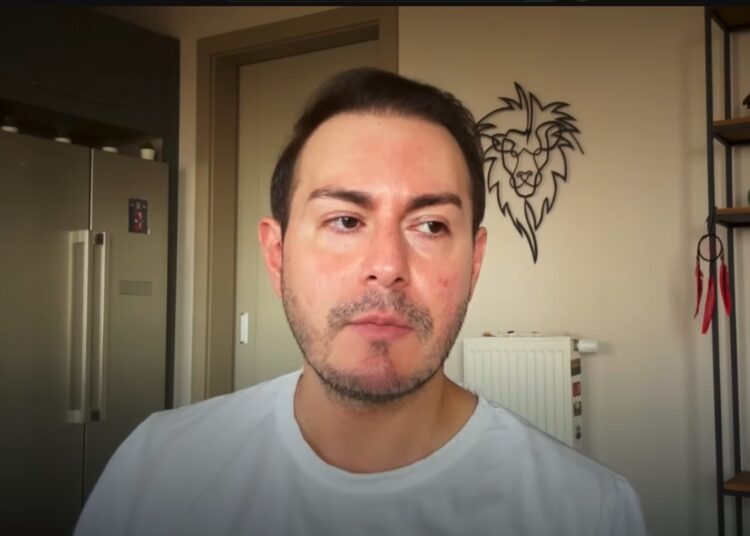Abdullah Bozkurt/Stockholm
In a defamation lawsuit filed in a US court, a social media influencer has been ordered to pay millions in damages to a Turkish-American entrepreneur who was falsely accused of terrorism due to an alleged association with a group critical of the administration of President Recep Tayyip Erdogan.
The case was filed in June 2021 in the United States District Court for the Southern District of Florida by Emin Gün Sirer, a former Cornell University computer science professor and the co-founder and CEO of Ava Labs, against Emre Aksoy, a Turkish national and self-proclaimed cryptocurrency marketing expert and influencer.
In his complaint, Sirer alleged that in February 2021, Aksoy, via his “Kripto Emre” YouTube channel, made defamatory statements falsely linking Sirer to an organization deemed a terrorist group by the Turkish government, causing substantial damage to his personal and professional reputation.
At the time of the smear campaign, Aksoy had approximately 180,000 YouTube subscribers and 100,000 Telegram followers. He allegedly sought to harm Sirer intentionally, raising accusations he later claimed to have overheard in casual conversation at an event in Turkey.
Sirer initiated the defamation case on June 22, 2021, after Aksoy escalated his allegations on the social media platform X and on Telegram. Aksoy urged his followers to “short $AVAX,” referring to Ava Labs’ cryptocurrency token, and falsely claimed that Sirer was affiliated with the Gülen movement — a charge Sirer categorically denied.
Complaint filed in US court for defamation against Emre Aksoy, a social media influencer:
The Gülen movement, inspired by the late Turkish Muslim scholar Fethullah Gülen, is a faith-based organization. Gülen, who had lived in self-imposed exile in the United States since 1999, passed away on October 20 from multiple health complications.
The movement has long been critical of Islamist President Erdogan on various issues, including pervasive government corruption and Turkey’s support for radical jihadist groups.
Erdogan branded the Gülen movement a terrorist organization following graft investigations that implicated him, while serving as prime minister, as well as his family, in criminal association with Reza Zarrab, an Iranian involved in sanctions evasion, as well as Yasin al-Qadi, a Saudi national once labeled by the US and the UN as an al-Qaeda financier.
Erdogan characterized the corruption investigations as an attempted coup against his government, leading to a widespread purge of police chiefs, prosecutors and judges involved in the cases. He cleared his Iranian and Saudi associates of wrongdoing, attributing the probes to a Gülen movement conspiracy — an allegation the movement has consistently denied.
Founded by Gülen in the 1960s, the movement has consistently opposed violence, condemning all acts of terrorism carried out in the name of Islam. Its primary focus centers on science education, social empowerment and interfaith dialogue, with hundreds of affiliated schools worldwide. In Turkey, the movement once operated over a thousand institutions, which were subsequently arbitrarily and summarily closed by the Erdogan government. Many of these schools were converted into imam-hatip schools, religious institutions that are training a new generation aligned with political Islam and form the backbone of Erdogan’s support base.

The politically motivated campaign against the Gülen movement has resulted in the imprisonment of tens of thousands in Turkey based on false accusations, while nearly 2 million alleged Gülen supporters have faced criminal investigations on fabricated terrorism charges in sham trials.
The Erdogan government’s designation of the group as the Fethullah Terrorist Organization (FETÖ), a derogatory acronym coined by the president, has not been acknowledged by democratically governed nations that uphold the rule of law. Furthermore, Erdogan’s repeated attempts to extradite Gülen followers from the US and Europe have failed due to a lack of credible evidence, though transnational crime remains a significant concern.
Sirer appears to be among the many individuals ensnared in the extensive smear campaign relentlessly pursued by the Erdogan government and its allies against critics and opponents. Regardless of any actual association with the Gülen movement, allegations of a FETÖ affiliation have evolved into a catch-all term employed by the Turkish government and its supporters, as well as by co-opted opposition figures, to defame anyone for political, business or personal gain.
The allegations against Sirer significantly impacted his business, rapidly spreading among the Ava Labs Turkish-user base, which constitute approximately 20 percent of the company’s community. These statements incited panic among users of the Avalanche platform, resulting in a marked decline in confidence and trust in both Sirer and the company.
Moreover, Aksoy’s comments led to a decline in the value of the AVAX token, adversely affecting Sirer’s personal finances and hindering the growth of Ava Labs. The repercussions also extended beyond user confidence, influencing the company’s business relationships in Turkey, including a crucial project with the Turkish Central Bank, which faced delays due to the allegations.
Email exchanges between the plaintiff’s lawyers and Emre Aksoy’s defense attorney reveal a pattern of evasiveness on Aksoy’s part for several months, culminating in a complete breakdown in communication. The correspondence highlights repeated attempts by the plaintiff’s legal team to engage Aksoy and his counsel in discussions regarding the case, but these efforts wree met with a minimal response or outright silence.
Sirer testified in court that the defamatory statements profoundly affected him on a personal level as well. He expressed his fear of being arrested or questioned by Turkish authorities while traveling to Turkey to care for his ailing father. To ensure his safety and that of his family, he was compelled to take additional security measures, which incurred a substantial expense.
Aksoy, who was served with a summons on July 6, 2021 at Miami International Airport while visiting Florida on vacation, attempted to have the court dismiss the lawsuit; however, his petition was denied in October of that year. He initially sought to defend himself against the charges and even retained an attorney. Later, he claimed that he had heard the allegations while chatting with individuals at an event in Ankara in 2018, although he could not recall their names. Throughout the proceedings, he failed to present any evidence to substantiate his claims.
At one point, Aksoy severed communications with his defense counsel and abandoned the proceedings without notifying the court. His lawyer subsequently withdrew from the case, citing “irreconcilable differences” with his client. Aksoy did not make any effort to hire a new attorney and failed to respond to repeated requests from the defense to schedule a deposition. Despite being summoned by the court, he never appeared for hearings regarding evidentiary findings.

Aksoy’s failure to comply with court orders resulted in significant consequences. In August 2022, the court granted Sirer’s motion for sanctions, striking Aksoy’s defense and entering a default judgment against him. In doing so, the court ruled that Aksoy’s allegations were false and accepted the plaintiff’s assertions in the complaint as true.
During an evidentiary hearing on damages in February 2023, the court heard expert testimony from academic Halil Yenigün, who discussed the escalating risks faced by individuals associated with the Gülen movement. He stated that Erdogan’s administration in Turkey has increasingly adopted authoritarian measures, imprisoning over 250,000 people on alleged affiliation with the Gülen movement and seizing their assets.
Yenigün recounted cases involving US nationals, including those of Professor Henri Barkey and NASA scientist Serkan Gölge, who was detained based on alleged links to the Gülen movement, often relying on secret witness testimony or the mere possession of one-dollar bills. He also highlighted that Turkish authorities have extended their campaign internationally, surveilling and publicly shaming expatriates such as prominent soccer player Hakan Şükür, who now resides in the United States.
Dr. Sanjay Unni, an expert in financial analysis and damages, provided court testimony examining the economic impact of the alleged defamatory statements on the cryptocurrency AVAX. His analysis revealed that AVAX experienced statistically significant abnormal returns — deviating from broader market trends — beginning on February 22, 2021, coinciding with the resurgence of the defamatory statements on social media. Dr. Unni concluded that the decline in AVAX’s price was not due to general market conditions, but was directly attributable to the defamation.
On April 28, 2023, US District Judge Beth Bloom issued a final judgment in favor of Emin Gün Sirer on the defamation count, awarding him a total of $3,081,681.76 in damages:
Sirer requested that the court award $17.4 million in compensatory damages, testifying to the financial and emotional toll the defamatory statements had inflicted on him and his business. The court accepted the well-pleaded allegations in Sirer’s complaint and determined that the defendant’s defamatory remarks had caused significant harm to Sirer, Ava Labs and the AVAX token.
On April 28, 2023, US District Judge Beth Bloom issued a final judgment in favor of Sirer on the defamation count. The court awarded Sirer a total of $3,081,681.76 in damages, itemized as follows: general damages of $750,000, special damages of $300,000, prejudgment interest of $31,681.76 and punitive damages in the amount of $2,000,000.
The award was based on the considerable harm inflicted on Sirer’s reputation, the financial losses incurred from the decline in the AVAX token’s value and the heightened security measures Sirer was compelled to implement due to the false allegations.
The court’s ruling underscores the serious consequences of defamatory speech, particularly when amplified by digital platforms. It serves as a warning to those who echo the Turkish government’s propaganda in defaming innocent individuals based on false charges. While perpetrators may evade accountability in Turkey, where the rule of law has effectively been suspended and the executive branch dominates the judiciary, the media and even opposition parties, they face significant repercussions in countries where the rule of law remains robust in protecting the rights of victims.












